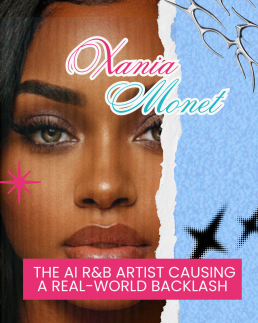Xania Monet
The AI R&B Artist Causing a Real-World Backlash
The music industry has officially entered a new era — one where record deals aren’t just being signed by singers, but by software.
This month, the internet has been buzzing over Xania Monet, an AI-generated R&B artist who reportedly signed a multi-million-dollar record deal with Hallwood Media after climbing the Billboard R&B Airplay charts.
She’s got a voice, a catalogue, a label — everything you’d expect from a real artist. Except she isn’t one.
Xania Monet doesn’t exist. Not in the way we understand existence.
And not everyone’s applauding.
A New Kind of Star
Xania Monet was created by Telisha “Nikki” Jones, a poet and lyricist from Mississippi, who used the AI music platform Suno to bring her creative vision to life.
Monet’s songs are sultry, soulful, and algorithmically perfect — her tone silky, her rhythm precise, her imperfections… nonexistent.
On paper, it sounds revolutionary: an artist who can sing forever, never gets tired, and doesn’t need a recording booth, tour budget, or vocal warm-up.
But to many musicians, it’s not innovation. It’s an invasion.
The Backlash Begins
The announcement of Monet’s record deal was met with immediate backlash across social media and within the music community.
Kehlani, the acclaimed R&B singer-songwriter, was one of the first to speak out.
In a viral post, she said:
“There’s an AI R&B artist who just signed a multi-million dollar deal… and the person is doing none of the work. Nothing and no one on Earth will ever be able to justify that to me.”
It’s a sentiment shared by many: that celebrating a machine-made artist in a genre built on emotion, storytelling, and lived experience feels like a betrayal of everything R&B stands for.
Because R&B isn’t just about sound — it’s about soul.
When the Machine Sings the Blues
There’s something almost poetic about an AI entering the world of R&B — a genre rooted in human vulnerability, pain, and love.
The irony isn’t lost on anyone.
How can a non-human entity sing about heartbreak, desire, or loss when it can’t feel any of those things?
For many artists, the rise of AI performers threatens to reduce art to data — stripping away the humanity that makes music meaningful.
Even if Xania Monet’s songs sound beautiful, they’re missing something invisible yet vital: a heartbeat.
The Industry’s AI Obsession
Record labels see AI differently.
They see efficiency. Consistency. Control.
An AI artist doesn’t demand royalties, take holidays, or go off-script in interviews.
It can be replicated endlessly, customised for audiences, and marketed across multiple languages.
It’s a label’s dream — and a human artist’s nightmare.
But there’s another layer too: AI models like Monet are trained using existing music. That means fragments of real artists’ vocals, melodies, and styles may have been used to create her sound — without their consent.
For many, that’s not innovation. It’s exploitation.
A Question of Authenticity
Every generation of musicians faces disruption — from autotune to streaming, technology has always redefined what’s possible.
But AI feels different because it doesn’t just enhance human creativity — it replaces it.
When an algorithm can now perform, produce, and promote itself, we’re forced to ask:
Where does human artistry fit in?
And more importantly:
Will audiences actually care who — or what — made the music, as long as it sounds good?
The Heart of the Matter
R&B is a genre that’s always been about emotion and truth — from Aretha Franklin to SZA. It’s the sound of real experience.
That’s why Kehlani’s response hit a nerve.
Her frustration isn’t just about job security — it’s about meaning.
Art isn’t just about output; it’s about connection.
AI can write, sing, and simulate emotion — but it can’t feel it.
And maybe that’s the point where audiences will draw the line.
The Future: Collaboration or Competition?
Xania Monet’s rise doesn’t have to spell the end of human artistry — but it should serve as a wake-up call.
If used responsibly, AI could be a collaborator — helping artists experiment, compose, or visualise ideas in new ways.
But when AI becomes the artist, it raises a deeper ethical question: what does it mean to create, when creation no longer requires being alive?
Whether you love or hate her, Xania Monet is here to stay — a mirror held up to an industry that’s racing ahead faster than it can define its own values.
The real challenge now isn’t whether AI can make music.
It’s whether music made by AI can still move us.

